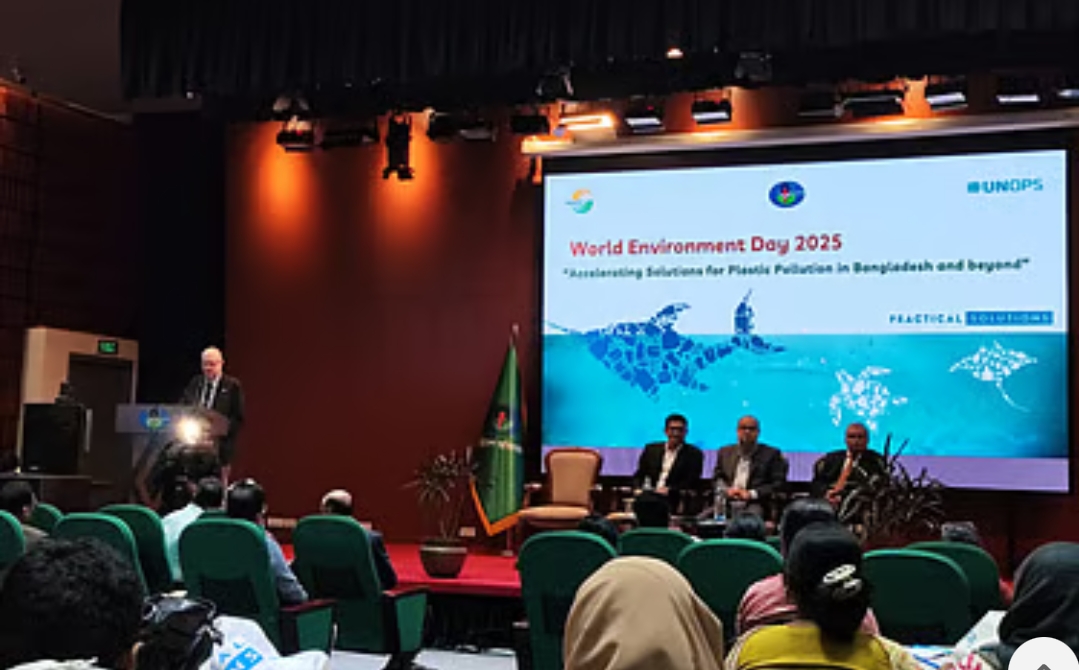Desk Report,
Calls for increased regional cooperation to stop plastic pollution
To stop plastic pollution, we must now move from awareness to implementation. We must involve young people in finding innovative solutions to deal with this crisis. In addition, we must increase cooperation from the local to regional levels to protect biodiversity and the environment from plastic pollution.
Calls for increased regional cooperation to stop plastic pollution
These were the speakers at a seminar organized at the seminar room of the Department of Environment in Agargaon, Dhaka, on Thursday.
As part of the celebration of World Environment Day, the United Nations Office for Project Services (UNOPS), BIMSTEC (Bay of Bengal Initiative for Multisectoral Technical and Economic Cooperation) and the Department of Environment jointly organized this seminar.
In his welcome speech at the seminar, UNOPS Country Manager for Bangladesh and Bhutan Sudhir Muralidharan said, “It goes without saying how harmful plastic is. Now is the time to move from awareness to implementation to stop this pollution.”
The UNOPS official said that the lack of implementation is often taken lightly. The implementation gap must be overcome to meet the Sustainable Development Goals. Regional cooperation must be increased in light of the United Nations Plastics Treaty. Bangladesh is one of the pioneers in plastic recycling. However, there is still a long way to go. He emphasized the importance of involving young people in finding innovative solutions.
BIMSTEC Secretary General Indra Mani Pandey said that the world’s ecosystem and biodiversity are now facing a crisis due to plastic pollution. There are a total of 1.8 billion people in BIMSTEC countries. Everyone is at high risk of plastic pollution. Therefore, local and national level initiatives as well as regional and global cooperation must be increased to stop this pollution.
To stop plastic pollution, we must now move from awareness to implementation. We must involve young people in finding innovative solutions to deal with this crisis. In addition, we must increase cooperation from the local to regional levels to protect biodiversity and the environment from plastic pollution.
These were the speakers at a seminar organized at the seminar room of the Department of Environment in Agargaon, Dhaka, on Thursday.
As part of the celebration of World Environment Day, the United Nations Office for Project Services (UNOPS), BIMSTEC (Bay of Bengal Initiative for Multisectoral Technical and Economic Cooperation) and the Department of Environment jointly organized this seminar.
In his welcome speech at the seminar, UNOPS Country Manager for Bangladesh and Bhutan Sudhir Muralidharan said, “It goes without saying how harmful plastic is. Now is the time to move from awareness to implementation to stop this pollution.”
The UNOPS official said that the lack of implementation is often taken lightly. The implementation gap must be overcome to meet the Sustainable Development Goals. Regional cooperation must be increased in light of the United Nations Plastics Treaty. Bangladesh is one of the pioneers in plastic recycling. However, there is still a long way to go. He emphasized the importance of involving young people in finding innovative solutions.
BIMSTEC Secretary General Indra Mani Pandey said that the world’s ecosystem and biodiversity are now facing a crisis due to plastic pollution. There are a total of 1.8 billion people in BIMSTEC countries. Everyone is at high risk of plastic pollution. Therefore, local and national level initiatives as well as regional and global cooperation must be increased to stop this pollution.




